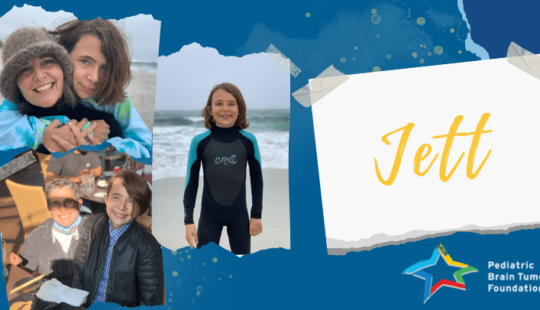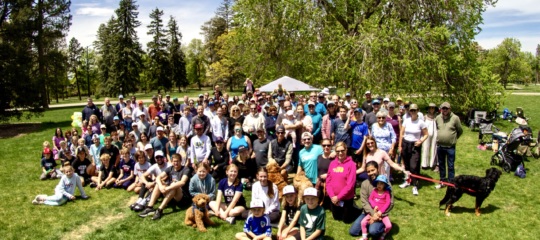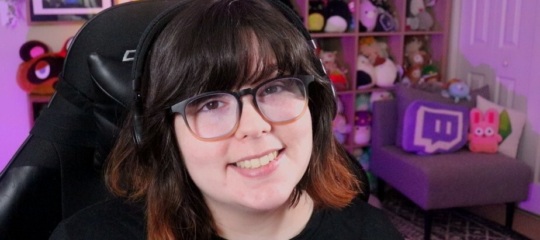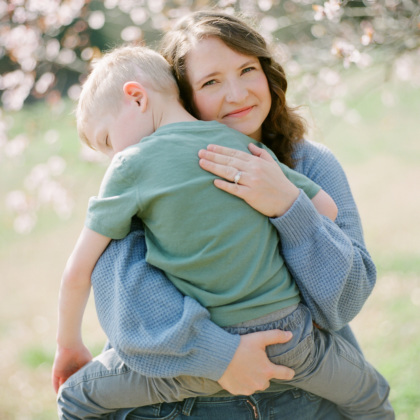
Jett: A Community Coming Together Following a Pilocytic Astrocytoma Diagnosis

When Jett was four years old his parents noticed a slight tremor in his left hand. His mother immediately knew something was wrong. Jett’s parents, Christina and Jude, watched the tremor for the next couple weeks as it progressed to a clenched hand, then a clenched arm.
Christina and Jude took Jett to his pediatrician, who then called for a neurological consultation. Minutes later they were told to get in the car and immediately go see the pediatric neurologist. In a five-minute diagnosis, the pediatric neurologist said Jett either had a stroke or a brain tumor. An MRI the next day confirmed there was a life-threatening brain tumor deep in his brain and he needed emergency surgery.
In a matter of days, their lives went from pediatrician appointment to a craniotomy and brain tumor resection and living in a hospital for three months of rehabilitation.
Jett was diagnosed with pilocytic astrocytoma, a type of tumor that tends to be benign; however, due to its shape, it often wraps around neurological structures and is difficult to resect without damaging those areas of the brain.
Jett was left paralyzed on the left side of his body and lost the left field of vision of both eyes. He’s still in ongoing physical and occupational therapy programs as there have been many cognitive and emotional consequences of his diagnosis. Yet, Jett is ambulatory—he can walk, run, and ride a skateboard. He won’t be able to drive a car or play sports, but he is currently managing to be in school for full days.
He doesn’t like to use a cane or anything that would identify him as visually impaired, so he often has collisions throughout the day.
“I really hope that at some point, Jett comes to appreciate the things he now hides as disabilities and tries to compensate for as deficits from the surgery, that he comes to realize that those are the areas of his greatest strength. I see him now as a tween, starting to try to conform and fit in. His left hand didn’t fully recover, so he probably won’t have use of his left hand and he hides it, like in a pocket of a hoodie. And with his blindness, not using the cane is really all about not wanting people to know about a vision impairment,” said Christina.
Children with brain cancer can’t wait another week, another day, another minute for your support. When you donate to the Pediatric Brain Tumor Foundation, you help fund life-changing research and provide families with the resources and support they need. Don’t let pediatric brain cancer steal another future.
For Christina and Jude, it was the shock of the diagnosis that was the hardest. They were living their lives with a healthy child and suddenly they received devastating news that rearranged their concept of reality. They will never forget the moment their doctor told them they found a mass deep inside Jett’s brain while waiting for Jett to wake up from anesthesia. It left psychological trauma that has continued for years where they couldn’t find peace again and couldn’t return to normal stability.
Their family is thankful for their strong community of family and friends from every area of their lives. Their friends rallied around them instantly and created a web of support on every level. While Jude and Christina had to leave their typical lives, their community took care of their lawn, dogs, and house. They fed them while they were in the hospital, often feeding the nursing staff that took care of Jett as well. Their community carried them through their journey physically and emotionally.
In addition to having a supportive community at home, Christina shared that having PBTF was a lifeline to be able to connect to other parents who simply and immediately understand the complexity and seriousness of what they were going through.
“Starting with the mentorship program and having a one-on-one with somebody who can be present and answer whatever questions come up is a really important access point. Instead of a whole bunch of information getting thrown at you, there’s one person who can field the questions that are most specific to your family and help you discern places where you can plug into the organization. I can imagine it could be overwhelming to somebody who doesn’t even know where to start.”
To learn more about PBTF’s peer-to-peer mentoring program and other family support resources, visit www.curethekids.org/family-resources
Related Stories


Community Spotlight: Tumor Trot 2024
After Marin was diagnosed with a brain tumor, her family was inspired to bring their local community together for their annual Tumor Trot that supports children like Marin around the country facing this devastating disease.

Pediatric Brain Tumors Shouldn’t Be Ignored Because They're Uncomfortable to Talk About
My brain tumor experience is something I think about every day of my life, but the outside world likes to erase that and pretend it didn’t happen. It’s too “taboo” or “uncomfortable.” So, this year, on the 7th anniversary of my surgery, I want to talk about it.
Related Updates
Ursula Burns, Former Xerox CEO, and Jordan Wertlieb, EVP and COO of Hearst, Appointed to Pediatric Brain Tumor Foundation’s Advisory Board as Inaugural Members
The Pediatric Brain Tumor Foundation today announced the appointment of Ursula Burns and Jordan Wertlieb as inaugural members of the organization’s new Advisory Board. Burns and Wertlieb offer their exceptional business acumen and experience to PBTF, the largest patient advocacy funder of pediatric brain tumor research.
Minor League Baseball Teams Unite to Support Children with Brain Cancer
Related Resources
Survivor Support Groups
About Pediatric Brain Tumors


